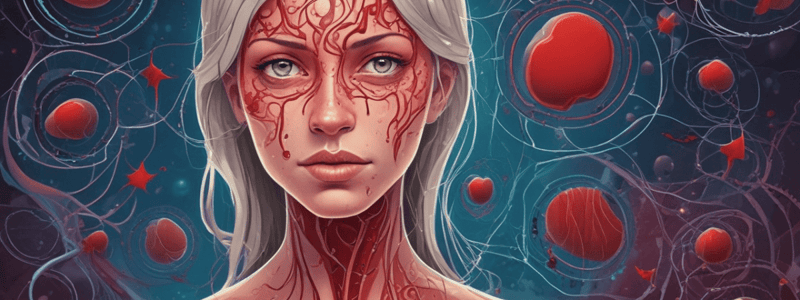Podcast
Questions and Answers
What is the inheritance pattern of hemophilia A and B?
What is the inheritance pattern of hemophilia A and B?
- Autosomal recessive
- Y-linked dominant
- Autosomal dominant
- X-linked recessive (correct)
What is the most common symptom of hemophilia?
What is the most common symptom of hemophilia?
- Sudden bloody noses
- Bleeding in the urine or stool
- Prolonged bleeding (correct)
- Easy bruising
What determines the severity of hemophilia symptoms?
What determines the severity of hemophilia symptoms?
- Amount of clotting factors in the blood (correct)
- Age of the individual
- Family medical history
- Sex of the individual
What is the clotting factor level in severe hemophilia?
What is the clotting factor level in severe hemophilia?
What is the first step in diagnosing hemophilia?
What is the first step in diagnosing hemophilia?
What is the type of mutation that can cause hemophilia?
What is the type of mutation that can cause hemophilia?
What happens when people have hemophilia?
What happens when people have hemophilia?
What is the most common type of hemophilia?
What is the most common type of hemophilia?
What is a common symptom of hemophilia in the mouth?
What is a common symptom of hemophilia in the mouth?
Who is more likely to inherit hemophilia?
Who is more likely to inherit hemophilia?
What is necessary for a female to show symptoms of Hemophilia A or B?
What is necessary for a female to show symptoms of Hemophilia A or B?
Where are the genes for Hemophilia A and B located?
Where are the genes for Hemophilia A and B located?
What is Hemophilia C?
What is Hemophilia C?
How is Hemophilia C inherited?
How is Hemophilia C inherited?
What is necessary for a person to have symptoms of Hemophilia C?
What is necessary for a person to have symptoms of Hemophilia C?
What determines the severity of hemophilia?
What determines the severity of hemophilia?
At what age are children with hemophilia often diagnosed?
At what age are children with hemophilia often diagnosed?
What is a common symptom of hemophilia in children?
What is a common symptom of hemophilia in children?
What does a high PT/INR result indicate?
What does a high PT/INR result indicate?
What does a complete blood count (CBC) measure?
What does a complete blood count (CBC) measure?
What is the purpose of a specific clotting factor test?
What is the purpose of a specific clotting factor test?
What is the scope of hemophilia's impact?
What is the scope of hemophilia's impact?
What is the primary goal of dental management for hemophiliacs?
What is the primary goal of dental management for hemophiliacs?
Why should hemophiliacs avoid certain pain medications?
Why should hemophiliacs avoid certain pain medications?
What is an alternative to aspirin and ibuprofen for hemophiliacs?
What is an alternative to aspirin and ibuprofen for hemophiliacs?
Why should intensive dental treatments be carried out in hospitals or community dental services?
Why should intensive dental treatments be carried out in hospitals or community dental services?
What is recommended for hemophiliacs to prevent gum disease and buildup of dental tartare?
What is recommended for hemophiliacs to prevent gum disease and buildup of dental tartare?
What is an important oral hygiene practice for hemophiliacs?
What is an important oral hygiene practice for hemophiliacs?
What percentage of the population in certain regions is affected by hemophilia?
What percentage of the population in certain regions is affected by hemophilia?
What is the current status of a cure for hemophilia?
What is the current status of a cure for hemophilia?
What is the main treatment for hemophilia?
What is the main treatment for hemophilia?
What is the purpose of Protein Replacement Therapy for hemophilia?
What is the purpose of Protein Replacement Therapy for hemophilia?
Why may people with hemophilia C require treatment?
Why may people with hemophilia C require treatment?
What is a common oral manifestation of hemophilia?
What is a common oral manifestation of hemophilia?
Why may people with hemophilia experience joint pain and limited mouth opening?
Why may people with hemophilia experience joint pain and limited mouth opening?
What is a key aspect of life enhancement for people with hemophilia?
What is a key aspect of life enhancement for people with hemophilia?
Flashcards are hidden until you start studying
Study Notes
Hemophilia
- A rare, genetic blood disorder where blood doesn't clot and bleeding doesn't slow down or stop due to low clotting factors.
- Three main types: Hemophilia A, Hemophilia B, and Hemophilia C, each caused by a deficiency of a specific clotting factor (factor VIII, factor IX, and factor XI, respectively).
Inheritance Patterns
- Hemophilia A and B are X-linked recessive diseases, where males are more affected because they only need one mutated gene to show symptoms.
- Hemophilia C is an autosomal recessive disease, where both males and females are equally affected and need two mutated genes to show symptoms.
Symptoms
- Prolonged bleeding, sudden bloody noses, bleeding of the mouth and gums, oozing after tooth extractions, bleeding in the urine or stool, easy bruising, joint bleeding (hemarthrosis), and bleeding into the brain.
- Severity of symptoms depends on the severity of the mutation.
Severity and Clotting Factor Levels
- Hemophilia can be categorized as mild, moderate, or severe based on the amount of clotting factors in the blood.
- Clotting factor levels:
- Severe hemophilia: less than 1% of normal clotting factors.
- Moderate hemophilia: 1% to 5% of normal clotting factors.
- Mild hemophilia: 5% to 30% of normal clotting factors.
Diagnosis
- Healthcare provider will start with a complete history and physical examination.
- Tests may include:
- Complete blood count (CBC).
- Prothrombin time test (PT).
- Specific clotting factor test.
- Genetic or DNA testing.
Epidemiology
- Hemophilia affects patients worldwide, with varying prevalence rates in different regions.
Treatment
- Currently, there is no cure for hemophilia.
- Main treatment is Protein Replacement Therapy, which involves infusing clotting factor concentrates (factor VIII for Hemophilia A or factor IX for Hemophilia B) into a vein to replace missing or low clotting factors.
- Additional treatments may include fresh frozen plasma and medications to prevent clotting factor breakdown.
Oral Manifestations and Dental Management
- Symptoms in the oral cavity include excessive gingival bleeding, high rate of infections, joint bleeds, and orofacial pain.
- Dental management involves:
- Obtaining medical history and communicating with hematologists.
- Avoiding certain pain medications that can exacerbate bleeding.
- Intensive treatments, such as deep cleaning and tartar removal, should be carried out in hospitals or community dental services.
- Maintaining good oral health through regular dental visits, brushing, and interdental cleaning aids.
Studying That Suits You
Use AI to generate personalized quizzes and flashcards to suit your learning preferences.




